Filter by
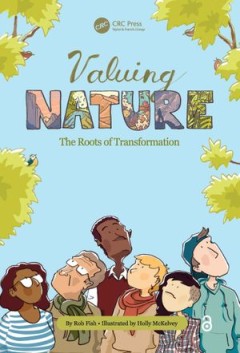
Valuing Nature The Roots of Transformation
When a group of liberal arts students embark on a university assignment about the natural environment, no one could have quite prepared them for the bewildering array of questions and provocations to confront them in their task. What starts out as an earnest attempt to understand nature in the modern world, turns into a philosophical and practical tangle that only a good transdisciplinary educa…
- Edition
- -
- ISBN/ISSN
- 1000428567, 9781000428568
- Collation
- -
- Series Title
- -
- Call Number
- -

Towards a Climate-Neutral Europe Curbing the Trend
This book explains the EU’s climate policies in an accessible way, to demonstrate the step-by-step approach that has been used to develop these policies, and the ways in which they have been tested and further improved in the light of experience. The latest changes to the legislation are fully explained throughout. The chapters throughout this volume show that no single policy instrument can …
- Edition
- -
- ISBN/ISSN
- 9781000750713, 100075071X
- Collation
- -
- Series Title
- -
- Call Number
- -
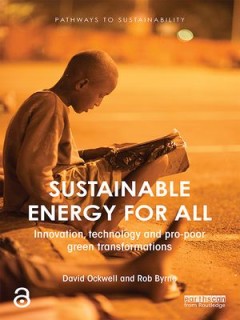
Sustainable Energy for All Innovation, technology and pro-poor green transfo…
Despite decades of effort and billions of dollars spent, two thirds of people in sub-Saharan Africa still lack access to electricity, a vital pre-cursor to economic development and poverty reduction. Ambitious international policy commitments seek to address this, but scholarship has failed to keep pace with policy ambitions, lacking both the empirical basis and the theoretical perspective to i…
- Edition
- -
- ISBN/ISSN
- 9781317220510, 131722051X
- Collation
- -
- Series Title
- -
- Call Number
- -
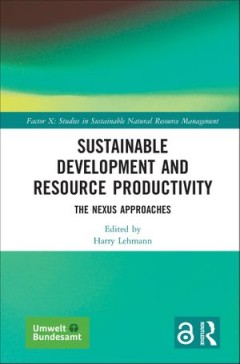
Sustainable Development and Resource Productivity The Nexus Approaches
The fourth Factor X publication from the German Environment Agency (Umweltbundesamt, UBA), Sustainable Development and Resource Productivity: The Nexus Approaches explores the interdependencies of sustainable development paths and associated resource requirements, describing and analysing the necessities for a more resource efficient world.The use of and competition for increasingly scarce reso…
- Edition
- -
- ISBN/ISSN
- 1000213749, 9781000213744
- Collation
- -
- Series Title
- -
- Call Number
- -
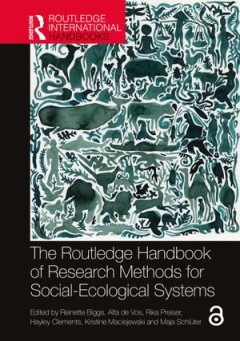
The Routledge Handbook of Research Methods for Social-Ecological Systems
he Routledge Handbook of Research Methods for Social-Ecological Systems provides a synthetic guide to the range of methods that can be employed in social-ecological systems (SES) research. The book is primarily targeted at graduate students, lecturers and researchers working on SES, and has been written in a style that is accessible to readers entering the field from a variety of different d…
- Edition
- -
- ISBN/ISSN
- 1000401510, 9781000401516
- Collation
- -
- Series Title
- -
- Call Number
- -
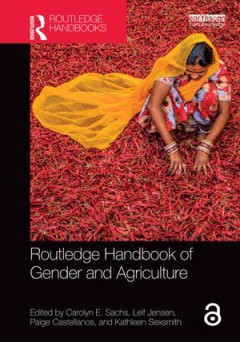
Routledge Handbook of Gender and Agriculture
The Routledge Handbook of Gender and Agriculture covers major theoretical issues as well as critical empirical shifts in gender and agriculture.Gender relations in agriculture are shifting in most regions of the world with changes in the structure of agriculture, the organization of production, international restructuring of value chains, climate change, the global pandemic, and national and mu…
- Edition
- -
- ISBN/ISSN
- 0429578466, 9780429578465
- Collation
- -
- Series Title
- -
- Call Number
- -
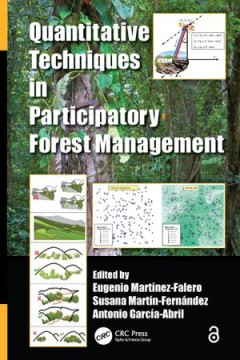
Quantitative Techniques in Participatory Forest Management
Forest management has evolved from a mercantilist view to a multi-functional one that integrates economic, social, and ecological aspects. However, the issue of sustainability is not yet resolved. Quantitative Techniques in Participatory Forest Management brings together global research in three areas of application: inventory of the forest variables that determine the main environmental indice…
- Edition
- -
- ISBN/ISSN
- 9781466569256, 1466569255
- Collation
- -
- Series Title
- -
- Call Number
- -
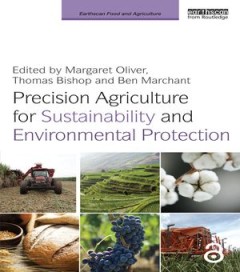
Precision Agriculture for Sustainability and Environmental Protection
Precision agriculture (PA) involves the application of technologies and agronomic principles to manage spatial and temporal variation associated with all aspects of agricultural production in order to improve crop performance and environmental quality. The focus of this book is to introduce a non-specialist audience to the the role of PA in food security, environmental protection, and sustainab…
- Edition
- -
- ISBN/ISSN
- 9781136468254, 1136468250
- Collation
- -
- Series Title
- -
- Call Number
- -
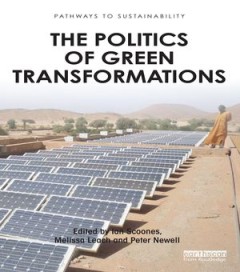
The Politics of Green Transformations
Multiple ‘green transformations’ are required if humanity is to live sustainably on planet Earth. Recalling past transformations, this book examines what makes the current challenge different, and especially urgent. It examines how green transformations must take place in the context of the particular moments of capitalist development, and in relation to particular alliances. The role of th…
- Edition
- -
- ISBN/ISSN
- -
- Collation
- -
- Series Title
- -
- Call Number
- -
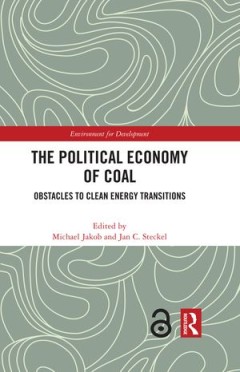
The Political Economy of Coal Obstacles to Clean Energy Transitions
This volume provides an overview of the political economy of coal in diverse country contexts.Coal is the largest source of greenhouse gas emissions globally, accounting for about 40 percent of energy-related CO2 emissions. Continued construction of coal-fired power plants could make the climate targets of the Paris Agreement infeasible to achieve. In spite of sharply declining costs for renewa…
- Edition
- -
- ISBN/ISSN
- 9781000551594, 1000551598
- Collation
- -
- Series Title
- -
- Call Number
- -
 Computer Science, Information & General Works
Computer Science, Information & General Works  Philosophy & Psychology
Philosophy & Psychology  Religion
Religion  Social Sciences
Social Sciences  Language
Language  Pure Science
Pure Science  Applied Sciences
Applied Sciences  Art & Recreation
Art & Recreation  Literature
Literature  History & Geography
History & Geography